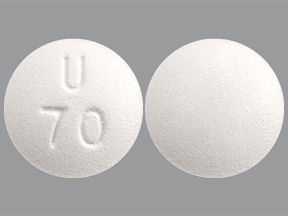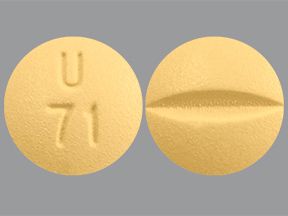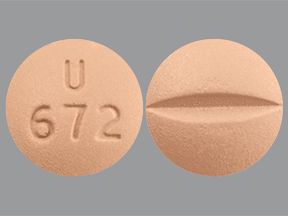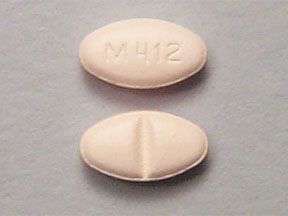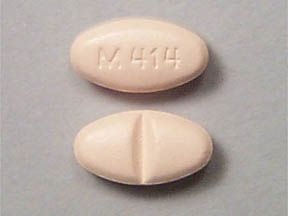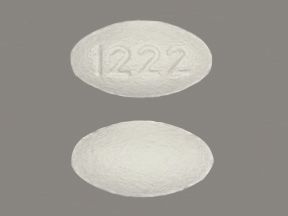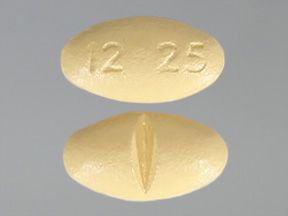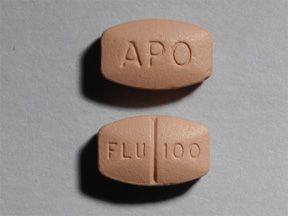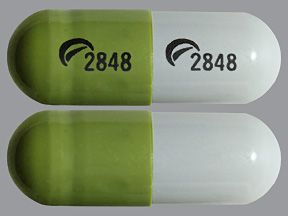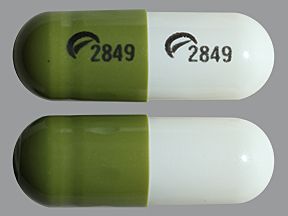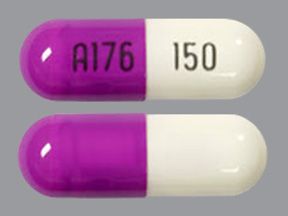Key takeaways
- Fluvoxamine is a generic medication used to treat obsessive-compulsive disorder (OCD) by increasing serotonin levels in the brain.
- This medication has a risk of suicidal thoughts and serotonin syndrome, requiring close monitoring for mood changes and symptoms like agitation or muscle stiffness.
- Fluvoxamine can interact with other drugs, such as MAOIs and certain antidepressants, potentially leading to serious side effects like heart rhythm problems or increased bleeding risk.
Fluvoxamine is a generic medication prescribed to treat obsessive-compulsive disorder (OCD) in adults and some children.
Fluvoxamine belongs to a class of drugs called selective serotonin reuptake inhibitors (SSRIs). It works by blocking the reabsorption of serotonin by nerve cells in the brain, so more of it remains active.
Fluvoxamine comes in two oral forms: an extended-release capsule and a tablet. (“Extended release” means the drug is slowly released into your body over a long period of time.)
This article is about the extended-release capsule form of fluvoxamine. For information about the tablet form, ask your doctor or pharmacist.
Fluvoxamine has a boxed warning. A boxed warning is the most serious warning from the Food and Drug Administration (FDA). For details, see the “Precautions” section.
Like most drugs, fluvoxamine may cause mild to serious side effects. The following lists contain some of the more common side effects fluvoxamine may cause, but they don’t include all possible side effects.
Keep in mind that side effects of a drug can depend on:
- your age
- other health conditions you have
- other medications you take
Your doctor or pharmacist can tell you more about the potential side effects of fluvoxamine. They can also suggest ways to help reduce side effects.
Note: After the Food and Drug Administration (FDA) approves a drug, it tracks and reviews side effects of the medication. Sharing your experience helps make medications safer for everyone by giving doctors and researchers more information about how the drug works in real life. If you develop a side effect while taking fluvoxamine and want to tell the FDA about it, visit MedWatch or call 800-FDA-1088.
Mild side effects
Here’s a list of some of the mild side effects that fluvoxamine can cause. To learn about other mild side effects, talk with your doctor or pharmacist, or see fluvoxamine’s prescribing information.
Mild side effects of fluvoxamine that have been reported include:
If these effects are mild, they may go away within a few days or a couple of weeks. If they’re more severe or don’t go away, talk with your doctor or pharmacist.
Serious side effects
Serious side effects from fluvoxamine can occur, but they aren’t common. If you have serious side effects from fluvoxamine, call your doctor right away. If you think you’re having a medical emergency, you should call 911 or your local emergency number.
Serious side effects of fluvoxamine that have been reported include:
- agitation, restlessness, anger, or irritability
- aggressive or violent behavior
- depression
- anxiety or panic attacks
- trouble sleeping
- serotonin syndrome
- eye pain
- closed-angle glaucoma
- swelling or redness in or around your eyes
- vision problems, such as blurred or double vision
- manic episodes
- boxed warning: risk of suicidal thoughts or behavior (see “Precautions“)
Side effects in children
Additional fluvoxamine side effects reported in children and adolescents include:
- agitation
- depression
- heavy menstrual periods
- flatulence (gas)
- rash
Allergic reactionFor some people, fluvoxamine can cause an allergic reaction.
But it’s not clear whether this side effect occurred in the drug’s studies.
In general, symptoms of an allergic reaction can be mild or serious.
What might help
If you have mild symptoms of an allergic reaction, such as a mild rash, call your doctor right away. They may suggest a treatment to manage your symptoms and can determine whether you should keep taking fluvoxamine.
If you have symptoms of a severe allergic reaction, such as swelling or trouble breathing, call 911 or your local emergency number right away. These symptoms could be life threatening and require immediate medical care.
If your doctor confirms you’ve had a serious allergic reaction to fluvoxamine, they may have you switch to a different treatment.
The fluvoxamine dosage your doctor prescribes will depend on several factors. These include:
- your age
- the severity of your obsessive-compulsive disorder (OCD)
- other medical conditions you may have
- how you react to the first dose
The following information describes dosages of fluvoxamine extended-release oral capsule that are commonly used or recommended to treat OCD in adults and some children. However, be sure to take the dosage your doctor prescribes for you. Your doctor will determine the best dosage to fit your needs.
Form and strength
Fluvoxamine oral capsules are available in two strengths: 100 milligrams (mg) and 150 mg.
Recommended dosage
The recommended fluvoxamine starting dose for adults is 100 mg at bedtime. Your doctor may increase your dosage weekly in increments of 50 mg as needed for maximum therapeutic benefit.
The maximum dosage of fluvoxamine should not exceed 300 mg per day.
About taking fluvoxamine
The following are answers to some common questions about taking fluvoxamine.
- Can fluvoxamine capsules be chewed, crushed, or split? No, you should not chew, crush, or split fluvoxamine capsules. You should swallow them whole with water. If you have trouble taking them, read these tips on how to swallow pills or ask your doctor or pharmacist for advice.
- Should I take fluvoxamine with food? Fluvoxamine can be taken with or without food.
- Is there a best time of day to take fluvoxamine? Your doctor will likely recommend you take fluvoxamine at bedtime. This helps keep a steady level of the drug in your body, which helps it work most effectively.
- What if I miss a dose of fluvoxamine? If you miss a dose, take it as soon as you remember. But if it’s almost time to take your next dose, skip the missed dose and take the next dose at its usual time. You should not take two doses at once to make up for a missed dose. Doing so could raise your risk of side effects.
- Will I need to take fluvoxamine long term? Fluvoxamine is typically used as a long-term treatment. If you and your doctor determine that it’s safe and effective for your OCD, you’ll likely take it long term.
Overdose
Do not take more fluvoxamine than your doctor prescribes, as this can lead to harmful effects.
Symptoms caused by an overdose can include:
- nausea, vomiting, and diarrhea
- trouble breathing
- racing or abnormal heartbeat
- extreme sleepiness
- shakiness
What to do in case of overdose
Call your doctor if you think you’ve taken too much fluvoxamine. You can also call 800-222-1222 to reach America’s Poison Centers or use its online resource. But if you have severe symptoms, immediately call 911 or your local emergency number. Or go to the nearest emergency room.
Before taking fluvoxamine, talk with your doctor and pharmacist. Tell them about all prescription, over-the-counter, and other drugs you take. Also tell them about any vitamins, herbs, or supplements you use. Sharing this information can help you avoid potential interactions.
Interactions with medications
The following table includes several drugs that can interact with fluvoxamine. This table does not show all drugs that may interact with fluvoxamine. Discuss all medications you take with your doctor before starting fluvoxamine.
| Medication | Possible adverse effects of interaction with fluvoxamine |
|---|---|
| thioridazine (an antipsychotic drug) | serious heart arrhythmias |
| tizanidine (a muscle relaxant) | drowsiness; sudden low blood pressure |
| pimozide (an antipsychotic drug) | serious heart arrhythmias |
| alosetron (a drug used to treat severe irritable bowel syndrome) | stomach pain; severe constipation |
| ramelteon (a drug used to treat insomnia) | drowsiness; headache; nausea; dizziness |
| benzodiazepines, including alprazolam and diazepam | increased benzodiazepine side effects |
| clozapine (an atypical antipsychotic medication) | increased clozapine side effects, including dizziness on standing up and seizures |
| nonsteroidal anti-inflammatory drugs (NSAIDs), including aspirin and ibuprofen | increased risk of bleeding |
| lithium | increased risk of seizures |
For more possible drug interactions with fluvoxamine, see the drug’s prescribing information or talk with your doctor or pharmacist.
Whether you have health insurance or not, cost may be a factor when you’re considering fluvoxamine. What you’ll pay for fluvoxamine may depend on several things, such as your treatment plan and the pharmacy you use.
Here are a few things to consider regarding cost:
- Comparing pharmacies: The price of fluvoxamine may vary depending on which pharmacy you use, so it can help to compare prices across pharmacies to find the lowest cost.
- Drug coupons: You may be able to find drug coupons on prescription discount websites that can reduce the cost of your medication. These coupons cannot be used with insurance copays or benefits, but the discounted price may be lower than what you would pay through insurance.
- Financial assistance: Some websites provide details about drug assistance programs, ways to make the most of your insurance coverage, and links to savings cards and other services. Two such websites are:
This section describes the warnings and precautions for fluvoxamine.
FDA warning: Risk of suicidal thoughts and behavior
Fluvoxamine has a boxed warning about risk of suicidal thoughts and behavior. A boxed warning is the most serious warning from the Food and Drug Administration (FDA) about drug effects that may be dangerous.
Fluvoxamine may increase suicidal thoughts or actions in some children, teenagers, or young adults. These thoughts or actions usually happen in the first few months of treatment or during dosage changes.
Call your doctor right away if you notice new or sudden changes in your or your child’s mood, behavior, actions, thoughts, or feelings, especially if they’re severe.
Other precautions
Before taking fluvoxamine, discuss your health history with your doctor. Fluvoxamine may not be right for you if you have certain medical conditions or other factors affecting your health. Be sure to talk with your doctor if any of the following apply to you:
- depression
- anxiety or panic attacks
- mania
- angle-closure glaucoma
- seizures
- liver problems
- previous allergic reaction to this or a similar drug
- pregnancy
- breastfeeding
- alcohol consumption
Sun sensitivity
Fluvoxamine can make your skin more sensitive to the sun. This increases your risk of sunburn. Avoid the sun if you can. If you can’t, be sure to wear protective clothing and sunscreen.
Help is out there
If you or someone you know is in crisis and considering suicide or self-harm, please seek support:
- Call or text the 988 Suicide and Crisis Lifeline at 988 or chat at 988lifeline.org. Caring counselors are available to listen and provide free and confidential support 24/7.
- Text HOME to the Crisis Text Line at 741741 to connect with a volunteer crisis counselor for free and confidential support 24/7.
- Not in the United States? Find a helpline in your country with Befrienders Worldwide.
- Call 911 or your local emergency services number if you feel safe to do so.
If you’re calling on behalf of someone else, stay with them until help arrives. You may remove weapons or substances that can cause harm if you can do so safely.
If you’re not in the same household, stay on the phone with them until help arrives.
Disclaimer: Healthline has made every effort to make certain that all information is factually correct, comprehensive, and up-to-date. However, this article should not be used as a substitute for the knowledge and expertise of a licensed healthcare professional. You should always consult your doctor or other healthcare professional before taking any medication. The drug information contained herein is subject to change and is not intended to cover all possible uses, directions, precautions, warnings, drug interactions, allergic reactions, or adverse effects. The absence of warnings or other information for a given drug does not indicate that the drug or drug combination is safe, effective, or appropriate for all patients or all specific uses.





